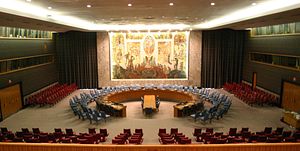On Saturday, after weeks of deliberations following North Korea’s first-ever test of an intercontinental-range ballistic missile, the United Nations Security Council unanimously adopted Resolution 2371. News reports almost universally described these sanctions as the widest-ranging and strongest-ever against North Korea.
On paper, the resolution looks quite robust. It bars North Korean exports of several key commodities – including lead, lead ore, iron, iron ore, coal, and seafood. According to Nikki Haley, the U.S. ambassador to the UN, the total damage to Kim Jong-un’s pocketbook would run in the range of US$1 billion, or roughly a third of North Korea’s overall trade revenue.
For an administration that has defined its North Korea policy under the flexible banner of “maximum pressure and engagement,” Resolution 2371 sure appeared to do the trick.
The trouble, however, begins with the details, as it often does with UN sanctions regimes. First, despite the alluring $1 billion sum cited above, the actual damage to North Korea is likely to be more modest. The figure presumes total compliance by UN member states, including China, which accounts for more than 85 percent of North Korea’s trade.
The Chinese eagerly pointed out that they would be the first to implement this resolution to the fullest extent possible, but history belies this point.
Resolution 2371 notably omits the humanitarian exception that previously allowed some otherwise proscribed trade so any detected enforcement violations will be less plausibly deniable – a small silver lining.
There is also the question of why China and Russia eventually acquiesced to the U.S.-drafted resolution in the first place. China agreed to similarly harsh resolutions last year after North Korea’s nuclear tests, but the Russians were obstructing action at the UN early on after North Korea’s July 4 test of the Hwasong-14.
Absurdly, they claimed that the missile launched was a medium-range ballistic missile while everyone – including the North Koreans, the United States, Japan, South Korea, and China – agreed it was an intercontinental range missile.
Moreover, the Russian affirmative vote came just days after U.S. President Donald Trump signed an extensive sanctions bill against Moscow into law, leading Russian President Vladimir Putin to force U.S. diplomatic staff out of their missions in Russia.
The answer lies in a simple cost-benefit calculation in Moscow and in Beijing. By allowing Resolution 2371 to take effect, both countries are likely to have calculated that the Trump administration will be less likely to proceed with secondary sanctions against Russian and Chinese entities and individuals associated with North Korea’s ballistic and nuclear programs.
In June the Trump administration announced new sanctions against the Bank of Dandong in China, which sits across the border from North Korea. Signs that a broader secondary sanctions regime is under consideration have been apparent since the administration began its North Korea policy review in February.
Resolution 2371, like previous UN Security Council sanctions resolutions against North Korea, appears robust, but will likely fall short where it matters: getting North Korea to change its ways.
Even if implemented well, trade accounts for a modest percentage of North Korea’s overall gross domestic product and the country has grown adept at economizing its pursuit of a nuclear deterrent. Pyongyang will steal, hack, and ransomware its way to canistered solid-fuel ICBMs if it must.
The Trump administration’s victory lap after Resolution 2371 should be short. North Korea will continue to test additional ballistic missiles and potentially even a thermonuclear weapon soon.
In the end, while condemnation and sanctions at the Security Council are far preferable to a devastating preemptive strike against Kim Jong-un’s ICBMs, changing North Korea’s behavior will require greater audacity from the Trump administration.
It will require a willingness to think seriously about diplomacy and, yes, talking to Kim Jong-un about his nuclear-tipped ICBMs and other missiles.
A version of this article first appeared in the South China Morning Post. It is republished here with kind permission.

































